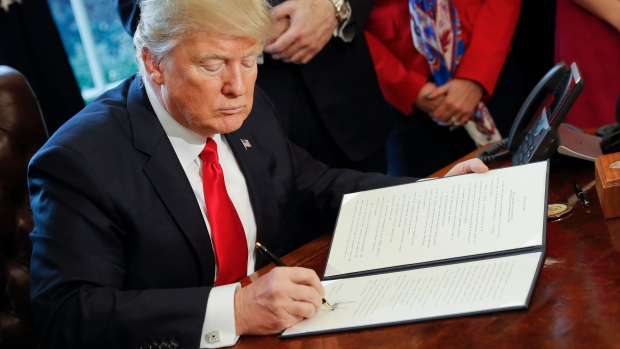Feb 7, 2017
'It's bad, it's bad, you know it': CIBC warns of risk to Canada if Trump implements border tax
, BNN Bloomberg

While there’s no certainty the Trump administration will implement a border adjustment tax, CIBC’s economics team is warning of severe consequences for Canada’s economy if Trump’s ‘America first’ vision creeps north.
CIBC Economists Avery Shenfeld and Benjamin Tal wrote in a note to clients that an across-the-board American import tax is something the Canadian economy needs to be ready for.
“At the micro level, export-oriented sectors such as transportation equipment, chemical, machinery and computers will feel most of the pain,” Shenfeld and Tal wrote in the report published Tuesday.
“What about for the economy as a whole? The starting point is that roughly one-fifth of Canada’s GDP is embodied in our exports to the U.S. So, to paraphrase Michael Jackson, it’s bad, it’s bad, you know it.”
CIBC notes that the tax is by no means a certainty and that early signs indicate the States’ “heavy guns” will be focused on Mexico and China rather than Canada.
“[T]here are some influential voices in both business and government stateside who value the two-way relationship between our two economies,” Shenfeld and Tal wrote.
Additionally, the Republican Party’s two-vote majority in the Senate may make such a tax difficult to pass into law if even mild resistance emerges within the GOP.
However, Shenfeld and Tal reckon it’s a difficult time to be making predictions on U.S. foreign policies.
“Trump is Trump, so we can never be sure about where the final policy shifts will take us. So it’s certainly not a small risk that the House proposal, including the border adjustment, becomes law.”
The slim Senate majority is not the only hurdle a potential border tax would face. Shenfeld and Tal note that retailers aren’t supportive of the tax, plus there’s a risk of Senate deficit hawks crying foul over the fiscal impact of sweeping tax reform that CIBC reckons could punch a US$3-trillion hole in the budget.
Still, despite the possible Stateside speedbumps, CIBC says both Canada and investors need to be prepared.
“With so many uncertainties on how such a sweeping reform might impact the U.S. and its trade relationships, there’s reason to hope that the Trump team will seek out a less revolutionary method of easing corporate tax burdens,” Shenfeld and Tal wrote. “But there’s enough at stake for Canadian business and investors that the upcoming debate on tax reform will be at the top of our agenda.”